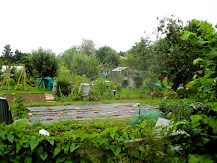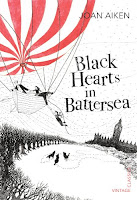As well as visiting new places, you can fight off holiday nostalgia by meeting new people. For all its faults, this is something that social media has made easier.
So it was that I found myself outside Church Stretton Co-op waiting to meet two philosophers from Crete. We had arranged for me to give them a tour of some of Malcolm Saville's Shropshire locations.
The philosophers were Keith Frankish and Maria Kasmirli, who also brought their young teenage daughter Matea. I have got to know Keith on Twitter over the years through a shared affection for Malcolm Saville's books.
The first location we went to was Hamperley Farm, the Ingles Farm of Saville's Lone Pine stories. You can see it in the photo above, which is by Keith Frankish.
Malcolm Saville describes Ingles Farm in Mystery at Witchend, the first Lone Pine book:
Ingles' farm was not very big, but the farmhouse of red brick was well set back from the road with a big lawn on the right and cowsheds on the left.
The real farm isn't red brick and, though there is a lawn, it's on the left as you face it. I was surprised that there was a lawn at all, because it's not there on the photos I took of the farm when I was last here in 2012 nor even on Google Street View today - a clear case of Shropshire being "more like it was now than it was then".
And, just as happened to the twins in Mystery at Witchend, we got asked inside. I can reveal that the farmer's family name is Foulkes, but he does have a son called Tom.
You can stay at Ingles Farm yourself. Some of the farm's outbuildings have been converted into two beautifully appointed holiday cottages and you can see them in the photos below. (Follow the link for more information.) There's even a sweet little postbox if you want to send postcards.
Then we went up the lane to the real Witchend - it's a private house, so please respect that if you ever make this pilgrimage yourself. This photo was taken on a sunnier day than the one we had.
After that we went around the southern end of the Long Mynd and then north through Wentnor (where the Crown is currently closed) and on to the Bridges Inn at Ratlinghope for a pot of tea.
This is the pub that featured in The Green Green Grass, while Malcolm Saville fans will know it as the Hope Anchor from the second Lone Pine book, Seven White Gates. Again this is a picture from a sunnier day when it was still called the Horseshoes Inn and looked shabbier than it does today.
Then is was up to the Stiperstones ridge.
I once heard a talk by Malcolm Saville's younger son the Revd Jeremy Saville in which he said he was pretty sure his father hadn't visited the Stiperstones when he wrote Seven White Gates. Even so, it's quite possible that Malcolm was right to paint the way from the pub to the Stiperstones as a rough, stony track rather than the metalled road it is today.
As we approached the car park near the Stiperstones ridge, we found that the Devil was in his chair - as the locals are supposed to say when the rock formation the Devil's Chair is obscured by cloud. By the time I took this photo, you could see it was going to clear from the west.
At this point I had better to pause to thank Maria for all the driving - the A roads in south Shropshire are single carriageway with lots of lorries, and the minor roads can be narrow and hilly. Not least the road we then took along the western side of the Stipersones through Stipersones village and Snailbeach, which has hairpin bends. And so we got back to Shrewsbury.
Thanks to Maria and Keith for their company - I even found time to talk philosophy with them too.


































